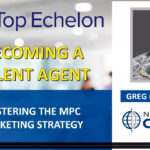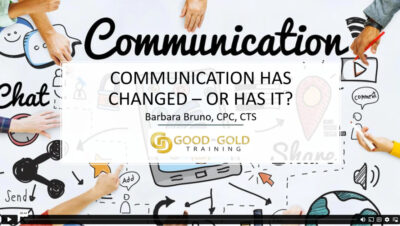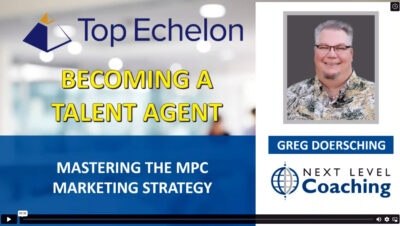Ours is a unique profession. Most of us got into recruitment after pursuing some other endeavor. Most of us didn’t go to a college or university to get a degree in recruitment.
But, for whatever reason, we ended up in this fascinating profession. And then, right away, our manager or some trainer told us that we needed to have the right attitude in order to be successful. And so we started to force that attitude in our mind.
Now don’t get me wrong. While a positive attitude is critical, most professionals have it because they have spent a lifetime acquiring knowledge that causes that attitude to naturally be there. If their confidence ever gets low, they don’t go home and look into a mirror and try to force themselves to have the proper attitude. They merely return to the knowledge they had previously acquired.
So those of us in selling need to follow the same path as any true professional. We need to have the ability to revisit our sources of knowledge.
The right attitude is comprised of two key elements:
1. Enthusiasm
2. Self-Confidence
Enthusiasm in recruiting
What are the two sources of enthusiasm?
#1—Product knowledge (knowing what we are selling)
This involves a detailed understanding of the specialty area in which we recruit and the candidates who populate that area.
#2—Knowing what we can do for others
We change lives for the better on a daily basis. We help both our client companies and our placed candidates to become more successful more quickly.
But occasionally, even the best recruiter loses their enthusiasm for their desk. Why do they lose their enthusiasm?
They become exhausted and worn out. If this happens, they need to take a couple of days off by relaxing, playing golf, fishing, etc.
Or they become too accustomed, or hardened, to what they can do for others. It gets to be “old hat.” So get in the habit of conditioning your thinking so that you can go back to what you can do for your clients and your candidates.
On every day of your selling lives, have a personal sales meeting—something that includes motivational literature, maybe a testimonial letter from a satisfied client or candidate. Read these over aloud for the animation to help get the words into your subconscious. (That’s the nine-tenths of your brain that controls your behavior.)
Self-confidence in recruiting
What are the three sources of self-confidence?
#1—Product knowledge
You need to know your specialty niche and the companies and candidates who live there. You need to know the lexicon of your specialty.
#2—People knowledge
You need to know the answer when your client or your candidate asks you a question. Remember, we are always looking for candidates who can make an impact on our client companies—either superstars (candidates who can make our clients money) or heroes (candidates who can save our clients money).
#3—Recruitment/selling skills knowledge
Here is the foundation that any good trainer will lay out for you. These are the tools of our trade—the MPC; the FAB; sales linkage; the qualifier job order; the eight-point candidate prep, etc. You just need to learn them and then use them on a daily basis. Treat your recruitment profession as a “process” and not a “series of events,” and you will be consistently successful.
Now that you know the sources of enthusiasm and self-confidence in recruiting, how will YOU apply this knowledge to your own desk to increase production?
— — —
Bob Marshall of TBMG International, founder of The Marshall Plan, has an extensive background in the recruiting industry as a recruiter, manager, vice president, president, consultant, and trainer. In 2015, Marshall is celebrating his 35th year in the recruitment business. He can be reached at bob@themarshallplan.org or at 770.898.5550. Marshall’s website is www.themarshallplan.org.








